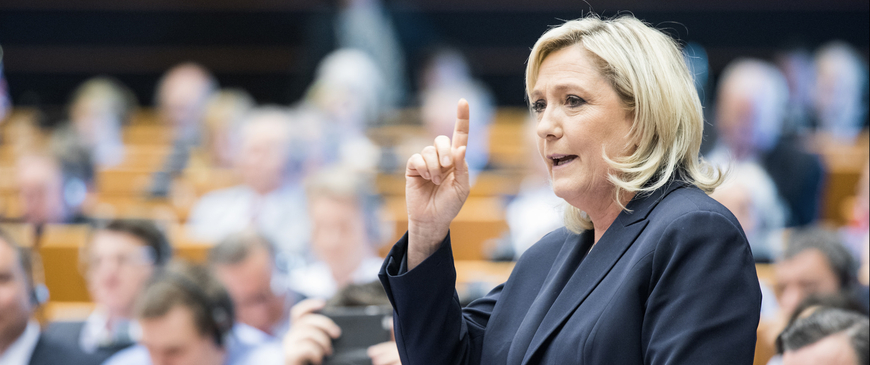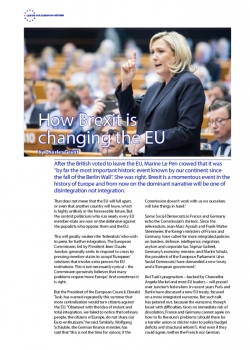
How Brexit is changing the EU
After the British voted to leave the EU, Marine Le Pen crowed that it was "by far the most important historic event known by our continent since the fall of the Berlin Wall". She was right. Brexit is a momentous event in the history of Europe and from now on the dominant narrative will be one of disintegration not integration.
That does not mean that the EU will fall apart, or even that another country will leave, which is highly unlikely in the foreseeable future. But the centrist politicians who run nearly every EU member-state are now on the defensive against the populists who oppose them and the EU.
This will greatly weaken the ‘federalists’ who wish to press for further integration. The European Commission, led by President Jean-Claude Juncker, generally seeks to respond to crises by pressing member-states to accept ‘European’ solutions that involve extra powers for EU institutions. This is not necessarily cynical – the Commission genuinely believes that many problems require ‘more Europe’. And sometimes it is right.
#Brexit is a momentous event in the history of Europe & now the narrative will be of disintegration
But the President of the European Council, Donald Tusk, has warned repeatedly this summer that more centralisation would turn citizens against the EU. "Obsessed with the idea of instant and total integration, we failed to notice that ordinary people, the citizens of Europe, do not share our Euro-enthusiasm," he said. Similarly, Wolfgang Schäuble, the German finance minister, has said that "this is not the time for visions; if the Commission doesn’t work with us we ourselves will take things in hand."
Some Social Democrats in France and Germany echo the Commission’s rhetoric. Since the referendum, Jean-Marc Ayrault and Frank-Walter Steinmeier, the foreign ministers of France and Germany, have called for more integrated policies on borders, defence, intelligence, migration, asylum and corporate tax. Sigmar Gabriel, Germany’s economy minister, and Martin Schulz, the president of the European Parliament (also Social Democrats) have demanded a new treaty and a ‘European government’.
But Tusk’s pragmatism – backed by Chancellor Angela Merkel and most EU leaders – will prevail over Juncker’s federalism. In recent years Paris and Berlin have discussed a new EU treaty, focused on a more integrated eurozone. But such talk has petered out, because the eurozone, though beset with difficulties, faces no immediate risk of dissolution. France and Germany cannot agree on how to fix the euro’s problems (should there be a transfer union or stricter rules to police budget deficits and structural reform?). And even if they could agree, neither the French nor German parliaments wants to transfer significant powers to eurozone or EU institutions. In any case, a new EU treaty would require referendums in Denmark, Ireland, the Netherlands and perhaps France – which could easily be lost. So there won’t be a major revision of the EU treaties any time soon.
From now on, if European leaders want to reform the EU they will have to pass laws, revise the budget or forge inter-governmental agreements. At some point they may need to adopt new laws to tackle the eurozone’s problems or the refugee situation, and these may give new powers to EU institutions. But the governments will not let the Brussels institutions set the agenda. Since the referendum, the Polish and Czech foreign ministers, as well as senior German Christian Democrats, have called on Juncker to resign. They want to give a clear signal that the Commission and the Parliament will be kept under a tight rein – even though blaming Juncker for Brexit, as some have done, is unfair.
A weaker Commission, however, brings economic risks, since it champions the single market. Some politicians now talk as if they can flout EU rules and Commission edicts with impunity – as when the French prime minister threatens to disregard the posted workers directive, unless it is revised so that Central European workers cannot undercut French ones; the Italian prime minister talks of ignoring EU rules that prevent him bailing out shaky banks; or many governments refuse to implement the law that obliges them to take quotas of refugees.
The Commission needs to work to restore its credibility in many capitals. That will mean adopting a less imperious tone; countering the perception that it always wants more power for itself; and demonstrating that it has not been captured by the Parliament. And it must reassure the Central Europeans that it pays attention to their concerns (it is currently trying to impose refugee quotas on them, while revising the rules on posted workers against their wishes).
Fear of greater German dominance are why EU politicians are so horrified by the prospect of #Brexit
In a more inter-governmental EU, Germany will be even more dominant. In recent years France’s weakness, the UK’s semi-detached status and the Commission’s lack of authority have propelled Germany into a solo leadership role. On issues such as the eurozone crisis, refugees and the war in Ukraine, Germany has determined the EU’s response. Fears of even greater German preponderance explain why politicians in Rome, Paris and Warsaw are so disturbed by the prospect of Brexit.
The Germans themselves are particularly unhappy about Brexit, and not only because they worry that other EU countries – responding to German hegemony – may be tempted to form an alliance against them. The Germans have also seen the British as allies for the causes of economic liberalism and smaller EU budgets.
Despite German worries, the EU is unlikely to become significantly more protectionist. Many EU governments, including those in the Nordic countries, Central Europe and the Netherlands, share the UK’s free market instincts. But without the British there will be less pressure for completing trade agreements and extending the single market into services.
The US worries that, without a firm UK supporting Merkel, the EU may relax the sanctions on #Russia
Policy-makers in the US are horrified by the referendum result. They saw the UK as a bridge between themselves and continental Europe. And they knew that on foreign policy questions, the UK tended to steer the EU towards relatively tough or US-friendly positions. The Americans now worry that, without British firmness supporting the hard line of Angela Merkel and other northern European leaders, the EU will be more likely to relax the sanctions it imposed on Russia after its intervention in Ukraine.
Although the EU faces many other grave problems, its leaders must now make the time for the Brexit negotiations. On one set of talks, covering co-operation on security issues, the British may find the 27 fairly flexible. This is because the UK can offer valuable assets, such as a seat on the UN Security Council, competent intelligence services, good diplomats, expertise on counter-terrorism and capable armed forces. If it behaves in a constructive and helpful manner, the UK may succeed in feeding its views into EU deliberations on foreign and defence policy, and in taking part in Europol, the European Arrest Warrant and EU criminal databases. But the UK will not write the rules and it will be much less influential than it has been.
When it comes to economic ties, the 27 will be much tougher than many Britons expect. European leaders have an interest in ensuring that the EU maintains a close economic relationship with the UK, for everyone’s benefit. But they will not compromise on fundamental principles, such as free movement of labour as the price for single market membership. And they will not want the exit talks to be pain-free, easy or pleasant for the British, since they wish to deter others from following the UK’s example. The opponents of Marine Le Pen and other populists want to be able to say; "Look at the mess the British are in, you don’t want that, do you?"
Charles Grant is director of the Centre for European Reform.


Comments
There is considerable opinion in Britain that it was the naive escalation in the Ukraine by the totally inept Baroness Ashton who has no previous experience in diplomatic matters that precipitated the situation. It was further exacerbated by the equally inept Van Rompuy that had the unmitigated gall to openly taunt Putin with the threat to 'bring all of Russia's Western border under EU control'. Certainly no Leader that cares for the status of his Country in much the same way that Kennedy saw the threat of the Cuban Missile threat to the US.
Putin has every right to counter such threat to his Country. That is not to say that there is any great regard for Putin; it is exactly the opposite but, call it British 'fair play', what is source for the Goose is sauce for the Gander.
It is all very well for the US to play geopolitics, but it is the Europeans (not just the EU) that will ultimately bear the brunt of it. Especially so as the US Military have openly admitted that they will be unlikely to be able to land sufficient resources to Europe to counter a Russian military threat.
As to the EU being unwilling to being pragmatic on 'Brexit', they will soon be looking for a reasonable compromise. In just 3 weeks since 'Brexit' there has been more than 20 overtures from World economies wishing a direct deal with Britain. This includes a statement by the US that they are wavering on a deal that does not include Britain.
China, one of the overtures, find that the EU is too complicated and is somewhat exasperated at the moment with Donald Tusk's intevention in the South China Sea.
Write off, if you will, Britains chances post EU, but it will be at the peril of losing momentum in a burgeoning British Market in the World that is, even at this early stage, very providential for Britain.